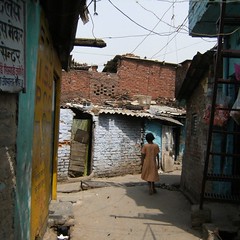
by Anuradha Bakshi | Jul 23, 2008 | Uncategorized
 The parliamentary debate on the confidence motion trust was a gloomy moment for all self respecting Indians. I will not delve into the matter as enough has and is being said. I followed bits and pieces of the day long saga with dismay, horror and immense sadness. Less said is better. I simply chose to mention a brave speech, that of Rahul Gandhi and who was heck;ed all the way.
The parliamentary debate on the confidence motion trust was a gloomy moment for all self respecting Indians. I will not delve into the matter as enough has and is being said. I followed bits and pieces of the day long saga with dismay, horror and immense sadness. Less said is better. I simply chose to mention a brave speech, that of Rahul Gandhi and who was heck;ed all the way.
Again I am not one who condones nepotism and dynasties nor am I a sycophant. What got my attention in this speech was the fact that perhaps it was the only one that referred to the other India in a humane and real way. When RG spoke of Kalawati, he gave a voice to the hundred of millions of faceless and voiceless Indians.
There are Kalawatis everywhere. People who live a hand-to-mouth existence in a land that is becoming more and more indifferent to their needs.They pass by us so quietly that we never see let alone acknowledge them. Yet many are the warp of our very existence. And even if they do not impact us directly they are the lifeline of those who make our lives more comfortable. I am talking about the man who sells hot food to the construction worker, the man who sells handkerchiefs, socks, and cheap ware on road sides, the one who sells plastic toys a father will take back to his child at the end of a long day.
Imagine the plight of such people as they set off every morning, weather notwithstanding, with their bundle, or cart not knowing whether they will be able to bring back sufficient money to feed the family for the next 24 hours. No one buys kerchiefs or head scarves every day! And every day the same amount of rupees buy much less food. Every week we make the appropriate sounds of dismay as we are hear the new inflation figures on our slick TVs in the comfort of our air conditioned room. Yet the size of our weekly basket barely suffers. For the Kalawatis across India the story is different and it is time that we took notice. I guess that is what RG wanted to do. But did we? Or should I say did those that matter notice. We all know the answer. they were too busy playing to the world gallery and bringing shame to each one of us.
I do not know whether the nuclear deal is good or not. I do not know whether RG’s speech was a clever political gimmick or one from the heart. I only know that it brought to the fore the reality of millions of our own country mates. I wonder how many of us can even begin to imagine what such a life means. I must admit that I too was one of those living in absolute denial. Pwhy changed all that.
I see the how inflation and price rise affects the common Indian in the lunch boxes of children everyday. I see it in the eyes of a child burning with fever who was not taken to the doctor for want of money. I see it in the backs that seem more bent and the gaits that have lost their spring. Can you imagine what goes on in the mind of a woman as she waits outside her home late in the evening, her kitchen fire cold, her vessels empty and her children hungry, waiting for her husband to come back with the the handful of rupees that will buy a meal and praying furiously that he does not stop by the watering hole. There are many such women and they live but a few stones throw away from us.
Have we all lost our conscience, or have we simply lost our ability to feel. Are we so lost in hubris that we are unable to see what is happening around us. I do not know. I just feel here is something terribly wrong. In all the hullabaloo of the parliament tamasha I just heard the silent deafeaning voice of Kalawati

by Anuradha Bakshi | Jul 17, 2008 | Uncategorized
 I normally do not watch TV in the early evening. I was busy with the usual evening chores and had to go to my daughter’s room. The TV was on. A local metro channel diffusing its evening news. I was about to mouth the question I had come to ask but was stopped short as I heard the voice of the newscaster recounting an incident where a young girl had been humiliated in a nearby suburban school. All chores forgotten I just watched.
I normally do not watch TV in the early evening. I was busy with the usual evening chores and had to go to my daughter’s room. The TV was on. A local metro channel diffusing its evening news. I was about to mouth the question I had come to ask but was stopped short as I heard the voice of the newscaster recounting an incident where a young girl had been humiliated in a nearby suburban school. All chores forgotten I just watched.
A young girl had been punished by her teacher for not being up to the market in class. The teacher who seemed to belong to some ante deluvial time had chosen to write in black soot across the face of the child the following words: I am not good in my studies, and then paraded the child across the school. The teacher of course had threatened the girl of dire circumstances were she to tell her parents about the incident. The young girl had not murmured a word. However the next day she had refused to go to school. Seeing the angst on her face the parents coaxed the child to reveal what was wrong. She ultimately did.
The parents went to the school authorities and the police playing the scene according to script. The teacher was suspended and further action may follow but will and can it wipe of the hurt the child suffered, the invisible scars seared on the girl’s soul that no one can see let alone heal. No matter what punishment will be meted out to the erring school teacher, no matter the profuse apologies tended, no matter the words proffered to sooth the hurt child, the harm is done. This young girl will bear the hurt of this humiliation for a life time. It may be forgotten in good times, if good times there are but will come back to haunt her each time life poses a problem. Public humiliation is by far one of the worst form of retribution, one that cannot be meted out to a child by anyone, let alone a teacher.
This incident makes one go back to Dickensian days of Dunce tables and Dunce caps. Lot of water has flowed since those days or so we thought. But an occurrence like this one makes us wonder whether times have truly changed.
But if that was not enough another horror that befell a tiny 9 year old came to light. A little class IV girl had been raped in the toilet of her school in broad daylight. As I write these words the follow up drama is in full swing. Enquiries, suspension, political condemnations, financial assistance and the much sought headlines. But my heart goes out to the little girl who has been scarred for life. Such incidents leave deep lifelong invisible scars not only on the body but on the soul of the victim. And if that was not enough, one must not forget that we live in an insensitive and biased society where far too often the victim is made to feel guilty.
I can only once again recount the plight of C, now 17, a past student of ours who was raped at the age of 4 by a neighbour. The rape was so violent that the child had to have a hysterectomy. The rapist did his time in jail. C grew up but . As a teenager she found herself ostracised by her peers and their families and labeled as the girl who had been raped.
Child rape is something abhorrent. I have no words to condemn it as everyone falls terribly short of what I want to express. I cannot begin to understand why an adult feels the need to violate a child. I look helpless at the impotent laws that far from protecting the victim seem to benefit the perpetrators with impunity.
In all the hullabaloo that normally follows incidents like the ones above, two little girls are suffering in silence. And no one seems to be concerned. They belong to homes where child psychology and post trauma stress are unknown. They belong to families who are simply busy surviving. They will have to find their healing alone, if healing there is.
At this times one can but remember the words of Herbert Ward: “Child abuse casts a shadow the length of a lifetime.”
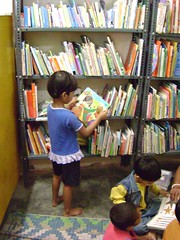
by Anuradha Bakshi | Jul 14, 2008 | Uncategorized
 A room without books is like a body without a soul said Cicero over two thousand years ago. Belonging to a generation where books were possibly our only real entertainment I readily second that. Then over the years, books played second fiddle to the new entertainment star the TV and then slowly third fiddle till they were relegated to the back row of the orchestra as an instrument barely played let alone heard.
A room without books is like a body without a soul said Cicero over two thousand years ago. Belonging to a generation where books were possibly our only real entertainment I readily second that. Then over the years, books played second fiddle to the new entertainment star the TV and then slowly third fiddle till they were relegated to the back row of the orchestra as an instrument barely played let alone heard.
I must admit that I never stopped reading though I must also confess that I was not able to instill this passion in others in my family. I lost the battle to the ever growing presence of the idiot box and its various courtesans – namely the remote control, the VCR, VCD and all else. Book reading for many just seemed a chore and a bore.
When project why began and before I was initiated to the reality of the school scenario in India, I had wanted pwhy to be a place where children could come after school and spend quality time. One of the things I wanted in pwhy was a library with an abundance of books so that children could be made aware of the magic of the written words. Like Skinner I too believed that we shouldn’t teach great books; we should teach a love of reading, as therein lay true education. But soon enough the dream of pwhy being a children centre replete with books, toys and games took a back seat as we were faced with alarming drop out rates, failing in school and the uncompromising abhorrence of parents to creative pursuits.
Reality moulded us into a school support centre where creativity had scant place. Books were only those taught in school and the few that found their way sat quietly in some dark corner, too few to make their presence felt. Even when we felt the need to have books – for the smaller kids at least – the cost itself ensured that there was never a book per child. The dream I once had seemed farther then ever.
Then one day a few months back I received an email from Willy of the Omprakash Foundation. It was I must confess mind boggling as it talked of sending tens of thousands of books to several projects in India and sought my help. And though the task was daunting and way off our beat, the fact that it concerned books made me accept readily. I guess that if it had been clothes or something else, I would have beaten a hasty retreat!
What followed was a journey into uncharted territory, one that was sometimes quite harrowing as we battled administrative and other blocks. But one did not give up and last week the consignment reached Delhi. Thanks heaven our friends from Omprakash Foundation were there too and afer some minor and sometimes amusing hurdles we at project why got not one, or ten or even hundred but twenty thousand books!
Though many still lie in boxes waiting for space, each of our centres now has books, either on a shelf when space permits or in a trunk and the children are for the first time in their lives discovering the magic of holding a book. It has been pure magic as they dive onto the trunks and retrieve books then go about flipping pages. The excitement is palpable whatever the age as they share what they see or even fight for a particular one. The teachers too are excited and planning new activities around they newly acquired treasure.
I watched all this with a sense of satisfaction and some glee. Somehow a long forgotten and almost lost dream seemed once again possible. The presence of so many books had suddenly made my dream of a children centre possible. It was time to fine tune the idea.
Ther soon will be a weekly library period in the time table. I remembered Willy telling me that in his school there was a moment called DEAR (Drop Everything And Read). Perhaps we too will have that at pwhy some day.
Some time back a friend sent me link about a new library fad whereby you borrowed a person not a book. Somehow it did not seem exciting to me. I also remember how moved I had been by Fahrenheit 451 the brilliant Truffaut film about a world without books. For me books remain a very important part of my life and high up on the list of my favourite things.
I hope that now they can also become part of the lives of the project why children.
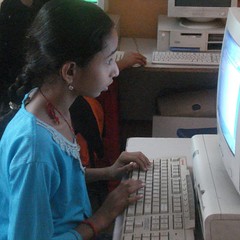
by Anuradha Bakshi | Jul 11, 2008 | Uncategorized
 A news item on a leading TV channel caught my eye yesterday. In spite of girls performing better in schools at every level, the number of girls joining the English medium stream in local government schools is still small. The reluctance according to a secondary school principal comes from the parents. In spite of the fact that their daughters have good marks, parents are often disinclined to see them join this stream. On the other hand they are insistent upon their son doing so, even if his performance is poor.
A news item on a leading TV channel caught my eye yesterday. In spite of girls performing better in schools at every level, the number of girls joining the English medium stream in local government schools is still small. The reluctance according to a secondary school principal comes from the parents. In spite of the fact that their daughters have good marks, parents are often disinclined to see them join this stream. On the other hand they are insistent upon their son doing so, even if his performance is poor.
Another sad tale of gender bias that seems to pervade every inch of our social fabric. Though reasons for such a behaviour were not spelt out, one can easily guess them. Girls are simply meant to be married and the less they know the easier things become. Too much education may just make them too difficult to handle.
Gender bias in present in each and every moment of a girl’s life, even before she is born. The sex ratio figures are ample proof of the number of girls that are denied the right to be born. It is believed that over 24 000 girls go missing every year in India’s capital city. And even after they are born girls do not get the same deal as their male siblings. I have often written about the plight of the girl child as about possible ways out. I have often felt at a total loss when in spite of all our efforts we have been unable to help a girl child. I have often sunk into despair at the deafening whys that have no answers.
We have over the past years tried to convey to parents that there is no difference between a boy and a girl but it seems that things have not changed. As I write these words I ask myself whether really have the right to proffer words of advice knowing that the reality on the ground has not changed. Girls are still considered a millstone as they need to be married and marriage costs more than one has. I refuse to believe that girls are not loved per se. It is the social burden that the presence of a girl in the family entails that causes people to shun the. Or to look at the coin from the flip side it is the lure of what a boy can bring in that makes people want them.
The bottom line still lies in changing customs and mores. Easier said than done. Customs and mores are deeply ingrained in our atavistic past. To change them requires not laws and sanctions but perhaps intervention from religious heads and social leaders. It also requires every one to walk the talk. Till then little girls will not get the same education, the same clothes, the same food or the same care as the one given unabashedly and without restraint to their male siblings.
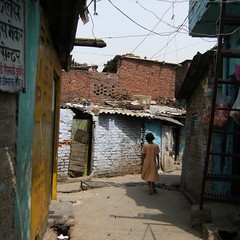
by Anuradha Bakshi | Jul 10, 2008 | Uncategorized
 Saving the planet is a fashionable conversation piece. It has been so for quite some time. Yet how many of us walk the talk? To once again use Don Rittner words: “Trying to save ecosystems has more to do with changing egosystems.”
Saving the planet is a fashionable conversation piece. It has been so for quite some time. Yet how many of us walk the talk? To once again use Don Rittner words: “Trying to save ecosystems has more to do with changing egosystems.”
And there are many egosystems at play.
We are all aware of what awaits us. Nature is making herself heard: untimely rains, no ice in the polar region and more of the same. But are we listening? We seem to be simply busy increasing our carbon footprint by the second. New credit options now available to all have increased the number of bikes, TVs and other energy consuming ware. A short walk though any slum in Delhi is proof of the fact that the one thing that is present in each and every home is a switched on TV, even is not one is watching. perhaps it is the indelible proof of a new success story.
What once was the prerogative of a chosen few, now permeates the lives of the poorest of the poor via the plastic pouch that makes even the most expensive item available to all. At the rate of over 10 pouches per family the load on the environment is difficult to fathom. The recently installed taps ring the newly acquired freedom from long trudges with heavy buckets by spewing water even when not needed.
The new credo of achievement and success in urban slums spells disaster for the environment. At the other end of the spectrum, things are no better. The rich and educated only pay lip service to environmental issues as they continue increasing their carbon foot print with impunity. Everyone is firm in their belief that they have earned the right to do so. A hubristic mood seems to have pervaded one and all. Nemesis looms large but no one seems to care.
In the strange interplay of egosystems lies the challenge of trying to raise awareness on environmental issues. Easier said than done. How does one go about asking people to give up what they have recently acquired after years and generations of want and deprivation. How does one tell the proud and slightly arrogant owner of a gleaming bike to walk rather than ride? How does one tell a family to switch off the TV that they dreamt of for years and whose droning helps alleviate many a harsh moment? The list endless and the arguments few.
And yet we all know that the writing is on wall.
At pwhy we have over the years tried to address these issues without much success. Most of our environmental programmes have not yielded the results we hoped. Though they may have given some short lived effect, we never managed to bring about sustained change. Yet we are aware of the fact that issues like water, plastic, and limiting carbon emissions are as important as the proverbial 3Rs but where does one begin, or should I say start again. Egosystems are hard to change. Perhaps we should just set about walking the talk.
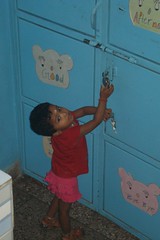
by Anuradha Bakshi | Jul 7, 2008 | Uncategorized
 India’s illiterate population equals all the people in USA screamed the headline of a State of the Indian Education report in a leading newspaper. It did not end there. The other headliners were: 9 out of 10 in class I won’t get to college, Most students pass, few actually learn and the supporting statistics were nothing short of chilling.
India’s illiterate population equals all the people in USA screamed the headline of a State of the Indian Education report in a leading newspaper. It did not end there. The other headliners were: 9 out of 10 in class I won’t get to college, Most students pass, few actually learn and the supporting statistics were nothing short of chilling.
India does a good job of getting children to start school but fails miserably to keep them studying as they grow older. That is the sad but indubitable reality. And if the pass percentages are increasing thanks to dubious programmes, the learning curve is declining day-by-day.
The report was alarming. Education for all seems to have failed miserably. True that the numbers ring true: number of children going to school, number of schools, number of teachers and even number of children passing, but the ground reality is abysmal. In our rush to meet quantity, quality was forgotten along the way. True we have schools buildings but a large number of them are not fit for consumption!
Politicians are busy securing their future and brandishing issues like reservations in higher education for the most backward classes and castes, but one wonders who will benefit from these lofty programmes. I guess their own kith and kin armed with a sound education obtained from a good public school.
Education for the poor in India is dying a slow insidious death. The onus of a good education for all has to be on the government who alone can provide the needed resources and regulatory systems but the government seems to have failed, and in some cases even given up as is amply proved by the rush to hand over education to NGOs or private hands. Privatisation of education will ring the death knell of education for the poor.
A couple of years back I was contacted by a high ranking officer in the Municipal Corporation of Delhi. A proposal for handing over municipal schools was being mooted. The officer wanted to know if i would be willing to take over the school located near our centre. This school is mostly attended by extremely poor and deprived kids. Wanting to now more I decided to play the game before hitting out and asked him what the deal was. We will pay the teachers salaries and you need to take over the rest was the answer. I wondered where the rest was supposed to come from: from donations or from fees. Needless to say the poor man got a mouthful from me! I had almost forgotten this incident.
Education in India today is a very sick child. And I am not only referring to state run schools. The other end of the spectrum is as dangerous. Instead of regular places of learning have sprung designer schools that bear no resemblance to what a school should look like hence alienating children from the reality that surrounds them and that they will one day have to live in. A ride from an air conditioned home in an air conditioned bus to an air conditioned school is what school is for some. Has one forgotten the gurukool of yore times where even the king’s sons had to undergo rigorous and austere training?
Where is the solution? I wonder….

 The parliamentary debate on the confidence motion trust was a gloomy moment for all self respecting Indians. I will not delve into the matter as enough has and is being said. I followed bits and pieces of the day long saga with dismay, horror and immense sadness. Less said is better. I simply chose to mention a brave speech, that of Rahul Gandhi and who was heck;ed all the way.
The parliamentary debate on the confidence motion trust was a gloomy moment for all self respecting Indians. I will not delve into the matter as enough has and is being said. I followed bits and pieces of the day long saga with dismay, horror and immense sadness. Less said is better. I simply chose to mention a brave speech, that of Rahul Gandhi and who was heck;ed all the way.









